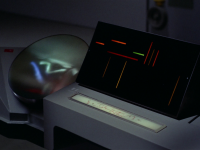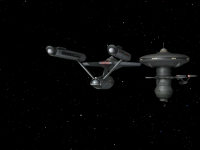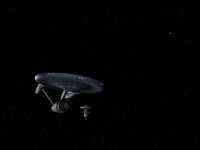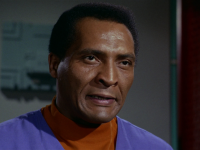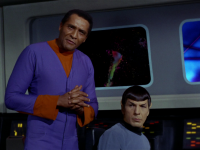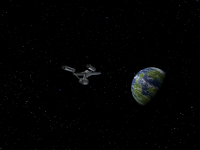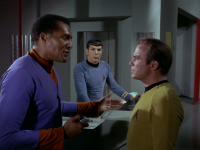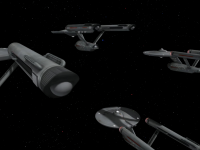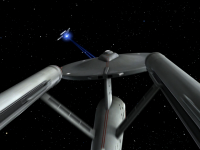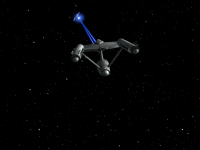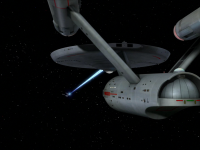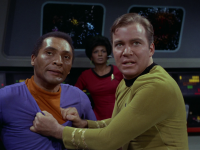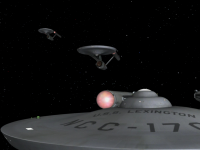Star Trek: The Original Series — 2x24 — The Ultimate Computer
Synopsis
Enterprise is used to test the new M-5 computer.
Filler rating: good filler
There's no essential plot or exposition in this episode that renders it unskippable, but it's definitely a fun ride!
Remarkable scenes
- Kirk: "There are certain things men must do to remain men. Your computer would take that away."
- Kirk questioning himself about whether or not his hatred of M-5 is because he doesn't want to lose his job.
- M-5 declaring Kirk and McCoy to be non-essential personnel for the away mission.
- M-5 performing excellently in a war game.
- Kirk: "Machine over man, Spock? It was impressive. It might even be practical." Spock: "Practical, Captain? Perhaps. But not desirable. Computers make excellent and efficient servants, but I have no wish to serve under them. Captain the starship also runs on loyalty to one man, and nothing can replace it, or him."
- Kirk: "20th century Earth. 'All I ask is a tall ship, and a star to steer by.' You could feel the wind at your back in those days. The sounds of the sea beneath you. And even if you take away the wind and the water, it's still the same. The ship is yours. You can feel her. And the stars are still there, Bones."
- M-5 going psycho on the autopilot ship.
- M-5 murdering one of the Enterprise crewmen.
- McCoy: "Please Spock do me a favor and don't say it's fascinating."
- M-5 going psycho on a fleet of four Federation ships!
- Daystrom pleading with M-5.
- Kirk talking M-5 to death.
Review
This is the best "Kirk-talks-a-computer-to-death" episode yet. The themes of luddism in Starfleet along with the superiority complex of an insecure genius are nicely explored by this well paced and reasonably deep story.
At first I groaned when the act out to the teaser closed on the apparent notion that the very idea of letting a computer control a starship should for some reason be considered scary, as the plot itself in that moment seemed to be exuding luddism. But as the episode progressed it became clear that this luddism, while common among many of the main characters, was regarded by the characters themselves as a character flaw. They all struggled with it and their ambivalence added a delightfully human counterpoint to a story about increased mechanization and automation leading to the obsolescence of certain jobs.
As for Daystrom, I was pretty disappointed by his character. My disappointment stems largely from the fact that as a concept, his character was terrific, but the execution left much to be desired. The basic theme of the story is that as a computer engineering genius and a prodigy at a young age, Daystrom is struggling to top the achievements of his youth by distinguishing himself yet again with an even better invention. That Daystrom's ultimate achievement turns out to be crucially flawed because he invested too much of his tragically flawed character into it is beautifully poetic writing.
Having Daystrom overestimate his own perfection in such a tragically public way by surmising that the best method for making the ultimate computer is to make it exactly like himself is a well written tragic irony and ends up being the centerpiece of the story. Daystrom is flawed. M-5 is a reflection of Daystrom. Hence, M-5 is flawed. But once we examine the details of how such a great concept unfolded in the actual storytelling, it starts to come off as somewhat less profound.
For starters, it's not clear why Daystrom required so much of the crew to evacuate the ship in the first place. Why not leave them aboard in case something goes wrong? Likewise, how could M-5 make such an obvious mistake as going out of its way to attack an ore freighter for no apparent reason or confusing a wargame with a real battle? These are no minor software bugs. You'd think Daystrom would have the resources at his disposal to test these very basic functions in a simulation before the field test with an actual starship. The only reasonable explanation at this point is that Daystrom was incompetent and that this incompetence was a result of his striking personal hubris.
That said, despite Spock's assessment otherwise, M-5's actions did conform to a certain logic, if you assume its motivations were the paranoia and megalomania imprinted onto it from Daystrom's personality. Erecting a forcefield around itself was certainly evidence of this, and a number of Daystrom's own statements lend credibility to this idea as well. At one point, Daystrom mentioned that M-5 was like a child to him and nearly came to blows with the Enterprise crew when they tried to shut it down after it so severely malfunctioned.
Likewise, when the fleet of four Federation ships attacked the Enterprise, Daystrom's only reaction to that was fear that M-5 could be destroyed in the battle, rather than acknowledging that many people could die, including himself, in the ensuing battle. Finally, the plot's resolution revolving around Daystrom's belief in god and the Federation's imposition of the death penalty on murderers doesn't paint Federation society in the most progressive of lights.
While the storytelling isn't perfect, with a few small tweaks and a better ending it could have been worth at least one more point. With the ending as written, Daystrom just suffers a nervous breakdown, Kirk saves the day, and we never hear from the poor man again.
A better version of this story would have omitted the attack on the ore freighter entirely and focused on a longer, more protracted wargame with the Federation fleet. I would also have had Daystrom talk down M-5 rather than have Kirk do it. A suitably profound climax scene would have featured Daystrom outlining to M-5 the flaws in its judgement while beginning to realize the flaws in his own judgement which led to his flawed creation in the first place. By confronting the flaws in his creation, Daystrom would finally begin to confront the flaws in his personality, leading both to the safe cessation of hostilities and a moment of profound personal growth for Daystrom.
Personally, I find that alternate ending a lot more touching than what we saw instead. However, as written, the episode is still terrific and one of Star Trek's best so far.
